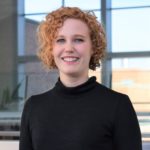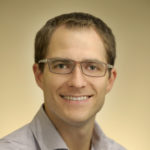BEAR Cage
1-3 p.m.
Monday
Science and Innovation Center (Level 2), KBHCCD
Three early career investigators are vying for a $10,000 cash prize during the ATS BEAR Cage competition on Monday afternoon. Each will “pitch” his or her proposal to a panel of translational science experts, which will ultimately select the winner.
The fifth annual Building Education to Advance Research (BEAR) Cage competition, which follows a Shark Tank-style of presentation, will award $10,000 to the top presentation and $2,500 each to the two runners-up.
This year’s finalists and their proposals are:
“Functional Lung MRI”
Adrienne Campbell-Washburn, PhD
National Heart, Lung, and Blood Institute
Q: What made you become a scientist/researcher?

Adrienne Campbell-Washburn
My undergraduate degree is in physics. I was excited about the idea of using something as theoretical as physics to have an immediate, practical impact, like improving human health. I had the opportunity to pursue some summer research projects in medical physics—and that was it, I was hooked.
Q: Why should the panel award you the top prize?
My new imaging technologies will provide a comprehensive assessment of lung anatomy, function, and physiology in a single session, free of ionizing radiation. The new MRI machine I am developing is also quieter, safer for patients with implants, and more cost-effective. I think my work could truly change the way we evaluate lung disease in the clinic, in addition to increasing access to advanced imaging world over.
Q: How will you spend the prize money if you win?
Probably to travel. I’ve lived in the U.S. for six years, and there are still so many national parks to see!
“Targeting Pulmonary Protease Activity With an HDL-Binding Protease Inhibitor Peptide”
Scott M. Gordon, PhD
University of Kentucky
Q: What made you become a scientist/researcher?

Scott M. Gordon
I have always had a passion for nature and biology. As an undergraduate, I majored in biology but had no serious career path in mind until I had a fantastic experience working in a research lab that gave me absolute clarity on my career goals. I love exploring unknown physiological pathways, tinkering with advanced technologies, and developing novel molecular tools.
Q: Why should the panel award you the top prize?
I am sure that all of the proposals include excellent innovations. I would just say that I believe I have developed a novel and creative approach to fulfilling a real medical need that exists in a large population of pulmonary patients. I am excited about its progress so far and the potential for actually improving quality of life for these patients.
Q: How will you spend the prize money if you win?
First, I would take my family on a decent vacation as a thank you for their understanding and support over the last year while I have been building my independent research lab. Then, I would try to make a small dent in the pile of student loans that paid for the education that has allowed me pursue a career that I absolutely enjoy.
“Steerable Electromagnetic Navigation Guided Endobronchial Radial Ultrasound With Biopsy Needle”
Jasleen Pannu, MD
Ohio State University
Q: What made you become a scientist/researcher?

Jasleen Pannu
A profound curiosity of why things work the way they do and what can be done to make them better. Encouragement from mentors and the growing field of interventional pulmonology has kept my inquisitiveness alive.
Q: Why should the panel award you the top prize?
My idea addresses a growing community need. If successfully implemented, it can be a cost effective, easy-to-use, and efficient tool for biopsy of lung nodules
Q: How will you spend the prize money if you win?
I will use it to invest further into building a collaboration between biomedical engineering and interventional pulmonology at my institution.
